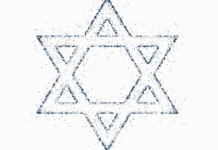(New York, NY; Jerusalem, Israel) 6 February 2023 – The YIVO Institute for Jewish Research and the National Library of Israel (NLI) are delighted to announce the completion of the digitization of the Papers of Chaim Grade and Inna Hecker Grade. Making this collection available online will enrich the lives of lovers of Jewish and Yiddish literature throughout the world.
The collection includes literary manuscripts and typescripts of prose, poetry, lectures, speeches, essays, newspaper clippings, galleys, personal notebooks, correspondence, and photographs spanning the years 1910 to 2010.
In 2013, the YIVO Institute and the NLI were awarded successor rights of the estate. Grade’s typewriter, other household items and personal artifacts relating to the lives of Chaim and Inna Grade are part of this collection. The physical assets of the estate are permanently housed at YIVO. The digital assets will be available on both the NLI and YIVO websites.
“The Grade archive and library are among YIVO’s most significant post-war literary acquisitions,” said Jonathan Brent, CEO and Executive Director of YIVO. “We are grateful to our colleagues at the National Library of Israel for helping to bring Chaim Grade’s collection of manuscripts, letters, and other documents— along with his 20,000-volume library— to YIVO. This collection has singularly enriched YIVO’s unparalleled archive of Yiddish literature and strengthened our commitment to preserve and perpetuate knowledge of Yiddish culture.”
“We are thrilled to announce the important addition of the Chaim Grade archive that enriches our Yiddish literary offerings,” Dr. Raquel Ukeles, Head of Collections at the National Library of Israel said. “Grade’s archive joins those of other paragons of Yiddish-language poetry and letters in our collection, such as Abraham Sutzkever, Itzik Manger, Yosl Bergner, Melech Ravitch, and many others. The archive’s availability online, reflecting our mission and mandate as the Library of the Jewish people, will be a huge benefit to readers and researchers worldwide.”
“Only Chaim Grade had the profound learning, personal experience, and Dostoyevskian talent to animate in fiction the destroyed Talmudic civilization of Europe. The moral intensity of his work now overpowers a new generation of readers,” stated Ruth Wisse, Martin Peretz Professor of Yiddish Literature and Comparative Literature Emerita.
“From his earliest literary efforts to his late in life masterpieces, Chaim Grade wrote like a man possessed. Possessed, first, by the spirit of the yeshiva world he’d left behind; then possessed by the spirits and memories of those who’d been murdered by the Nazis. No monument could ever stand in for that monumental loss; but it is Grade’s fiction — more, perhaps, than that of any other writer — that serves to illustrate the dimensions of that loss, and to present it to readers for whom the Yiddishland of Eastern Europe cannot even be a memory, ” said Jeremy Dauber, Atran Professor of Yiddish Language, Literature, and Culture at Columbia University.
“There were two central Yiddish writers who survived: Avrom Sutzkever in the Vilna Ghetto, and Chaim Grade, as a refugee in the USSR. When Grade arrived in the U.S., in addition to poetry, he added important prose works that recreated and re-lived the Jewish world in Vilna and yeshiva life. This pivotal decision affected all post-Holocaust-era Yiddish literature. I congratulate the cooperation on the digitized Chaim Grade archive between YIVO and NLI – which also houses the Sutzkever archive – that demonstrates how important these joint efforts are for the Jewish world,” said Prof. Avraham Novershtern, Director of Beit Schalom Aleichem in Tel Aviv.
Chaim Grade was born in 1910 in Vilna, Poland (now Vilnius, Lithuania). In his youth, Mr. Grade was a founding member of the Yung-Vilne literary group, known for its leftist politics, secular Jewish thinking, and literary influence. After losing both his mother and wife during the Holocaust, he emerged as one of the most prolific and defining Yiddish voices in post-war literature. The power and depth of his works is unparalleled. Besides publishing several volumes of poetry, he is best known for his two acclaimed novels, The Agunah and The Yeshiva.
Inna Hecker was born in Dnipropetrovsk, Ukraine, in 1925. Her father, a surgeon and ophthalmologist, enlisted in the war and was sent to the front line where he was captured and murdered by the Germans for being a Jew. In the fall of 1941, Inna and her mother fled to Chelyabinsk after the German occupation of their home city. She met Chaim Grade during World War II in Moscow and they married in 1945. In 1948, Inna and Chaim Grade immigrated to the United States. Inna studied literature and received a master’s degree from Columbia. She was fiercely protective of her husband’s work and legacy.
The collection helps to illustrate Grade’s literary development and impact on Yiddish literature, from his earliest poetic works written in Vilna and the Soviet Union to his prolific and accomplished prose work composed mainly in the United States. The collection also illuminates Inna Grade’s intellectual and academic accomplishments, as well as the integral role she played in the editorial and logistical aspects of Grade’s literary output.
Publishing projects of Grade’s works are now underway with Schocken Books and with various publishers around the world.
The entire archive is now publicly accessible at: https://archives.cjh.org/repositories/7/resources/556.
https://www.nli.org.il/en/archives/NNL_ARCHIVE_AL990026508670205171/NLI
About YIVO
The YIVO Institute for Jewish Research is dedicated to the preservation and study of the history and culture of East European Jewry worldwide. For nearly a century, YIVO has pioneered new forms of Jewish scholarship, research, education, and cultural expression. Our public programs and exhibitions, as well as online and on-site courses, extend our outreach to a global community. The YIVO Archives contains 24 million unique items and YIVO’s Library has over 400,000 volumes—the single largest resource for the study of East European Jewish life in the world. yivo.org
About the National Library of Israel
Founded in Jerusalem in 1892, the National Library of Israel (NLI) serves as the dynamic institution of national memory for the Jewish people worldwide and Israelis of all backgrounds and faiths. NLI collection highlights include significant handwritten works by luminaries such as Maimonides and Sir Isaac Newton, exquisite Islamic manuscripts dating back to the ninth century and the personal archives of leading cultural and intellectual figures including Martin Buber, Natan Sharansky and Naomi Shemer. NLI also holds the world’s largest collections of textual Judaica, Jewish and Israeli music, and maps of Jerusalem and the Holy Land, as well as world-class collections of manuscripts, ancient maps, rare books, photographs, communal and personal archival materials, and more.
While continuing to serve as Israel’s pre-eminent research library, NLI is now in the midst of an ambitious journey of renewal to encourage diverse audiences in Israel and around the globe to engage with its treasures in new and meaningful ways. This is taking place through a range of innovative educational, cultural and digital initiatives, as well as through a new landmark building and campus, scheduled to open its doors in 2023, that will reflect NLI’s central values of democratizing knowledge and opening its collections and resources to as broad and diverse an audience as possible. For more information: www.nli.org.il/en
For media inquiries please contact:
| Shelly Freeman Chief of Staff YIVO Institute for Jewish Research sfreeman@yivo.cjh.org |
Rachel Neiman International Media Relations The National Library of Israel rachel.neiman@nli.org.il |
























